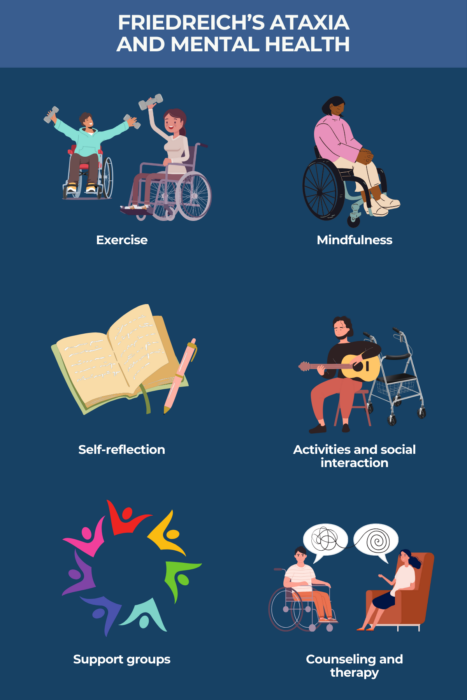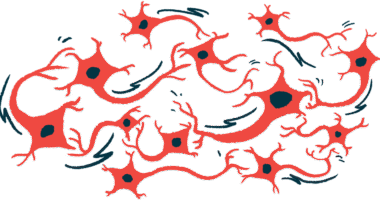
Mental resilience and FA: Embracing emotional wellness
Last updated March 29, 2024, by Susie Strachan

Friedreich’s ataxia (FA) causes problems with coordination and balance (ataxia), muscle weakness, heart problems, and neurological issues. But learning to live with a chronic disease like FA also can affect your mental health.
It’s important to remember you are not alone and help is available.
Some ways to address the impact on your emotional well-being include getting professional assistance from mental health counselors, building a robust support network of family and friends, and practicing self-care.
 Find an FA specialist near you
Find an FA specialist near you
Accepting your diagnosis
It’s normal to feel overwhelmed after a diagnosis of FA. It’s not unusual to experience a range of emotions, including confusion, anger, fear, and grief.
First, learn about FA, a progressive disease caused by mutations in a gene. It leads to a deficiency in a protein called frataxin that ultimately results in nerve damage and a weakening of muscles.
As part of a comprehensive medical management plan, your healthcare provider can offer educational resources to help you and your family understand FA and its progression. They also can refer you to FA support groups or specialized mental health professionals.
Carl Nassar, PhD, is a licensed professional counselor and certified international integrative psychotherapy trainer and supervisor practicing in Fort Worth, Texas.
Nassar says that a diagnosis of an illness like FA can create a loss of identity, make it difficult to continue doing certain activities, and take a toll on your mental health.
“In addition to having to deal with a change in your identity, a change in what you can do,” Nassar says, “there’s also the simple fact that while you’ve changed, the world around you hasn’t.”
It’s natural to feel anxiety when learning your body is more fragile than most people, more at risk than most, and knowing you’ll have to spend more time focused on taking care of your health, he says.
While there is no known cure, there are FA treatments that can slow its progression as well as therapies for FA symptoms, including medications, and physical, occupational, and speech therapy.
Learning how to manage your symptoms, doing exercises to build up muscles, and setting up a daily routine are just some of the ways you can help yourself feel more in control.
Taking each day as it comes
Life with FA means trying to live in the moment and finding ways to adapt to challenges.
If you are having FA mental health issues that are left untreated, it can affect how well you do at school or work. It also can cause problems with concentration and a loss of interest in social interactions, according to Jasmine Sawhne, MD, a board certified psychiatrist practicing in California and New York.
“Struggling with mobility and relying on others for assistance can impact self-esteem and self-confidence,” she says.
Sawhne notes there are a number of other emotional challenges people living with FA may experience.
“Causes of anxiety include concerns about one’s medical treatments, such as effectiveness or potential side effects, as well as worries about disease progression, loss of independence, and managing daily activities,” Sawhne says. “Dealing with the uncertainty of how the disease will progress and its impact on daily functioning can be overwhelming.”
Rather than ignoring these feelings, Nassar suggests examining your sadness, fear, anxiety, and anger.
“What’s most important is to slow down into our sadness, to slow down into our fear or our anxiety,” he says. “When these fall upon us, we want to welcome them like small children, sit them down on our lap, and listen to what our sadness or our anxiety is here to tell us. And then we want to respond to these feelings with compassion and reassurance, taking them seriously and responding meaningfully.”
Some other ways to improve self-awareness and counteract stress include:
- writing about your emotions in a journal
- setting achievable short-term and long-term goals
- sharing your feelings with family and friends
- finding a hobby or exercise you enjoy
- spending time in nature
- trying a stress-management technique such as mindfulness, meditation, or deep breathing.
Sawhne advises to avoid unhealthy coping strategies, which include substance use, behaviors such as procrastination, daydreaming to escape reality, and denying your emotions.
Meditation and mindfulness
Mindfulness and meditation are practices that can support you in becoming more fully engaged in the present and less fearful of the future. They can help you become more relaxed, improve your concentration, and be more self-aware, as well.
Both practices can help you manage pain and sleep better, which are common challenges for people with FA.
Mindfulness can be incorporated into movement activities that can improve flexibility and balance, such as gentle yoga or tai chi.
Beginners can start with guided mindfulness or meditation sessions, either through apps, online resources, or with the guidance of a professional.
A simple meditation exercise follows these steps:
- Find a quiet place where you won’t be interrupted.
- Sit or lie down in a comfortable position.
- Close your eyes.
- Focus on your breath, noticing each inhale and exhale.
- Inhale to the count of four, hold for a count of two, then exhale to a count of four.
- If your thoughts stray, bring them back to your breath.
- When ready, bring your thoughts back to your surroundings and open your eyes.
Practice this focused breathing for a set amount of time, such as five, 10, or 15 minutes. Gradually increase time as you become more comfortable with the practice.
Exercise
A physical or occupational therapist or a personal trainer familiar with FA can develop an exercise program that helps you increase your strength and improve your balance, both of which are affected by FA.
Exercising can provide a range of mental health benefits, helping you to feel less stressed and improve your sleep. It creates a stronger mind-body connection, improves energy levels, and can help decrease feelings of anxiety and depression.
Joining a team or exercise or training group also can expand your social circle.
Sawhne says she encourages “regular physical activity, maintaining a healthy diet, and ensuring adequate sleep to support mental well-being.”
Exercises suitable for FA include:
- strength training for the legs, arms, and core muscles to help maintain posture and trunk control
- stretching to help prevent muscle contractures and relax tight muscles
- coordination training to maintain a good sense of motion, positioning, and balance
- balance exercises to maintain stability when sitting, standing, and walking
- conditioning exercises to boost heart and lung function, and overall endurance.
Activities and hobbies
Finding activities and hobbies you enjoy can be an outlet for stress by redirecting your focus and energy in a positive way.
Many hobbies involve some form of creative expression, whether it's through art, writing, music, or other activities. Progress in a hobby can boost self-esteem and create a sense of accomplishment, contributing to a healthier self-image.
Taking up a new activity can help you feel empowered, as well as be an opportunity for making new social connections.
Some hobbies and activities to consider are:
- painting or drawing, using adaptive tools
- adaptive sports such as wheelchair tennis, adaptive cycling, and power soccer
- gardening in raised beds or containers
- expressing thoughts and emotions in a journal
- community service or volunteer work
- online courses or workshops in topics of interest
- puzzle-solving activities like crosswords, sudoku, and jigsaw puzzles.

Support groups
Joining an FA support group, either in-person or online, can be an important part of your emotional journey. It can be beneficial to connect with others who understand what it’s like to live with FA.
Sawhne says that joining support groups is one of her biggest recommendations as a psychiatrist.
“These can provide tremendously valuable emotional support and validation,” she says.
Some ways to find FA support include:
- The Friedreich’s Ataxia Parents Group, or FAPG, is an online support group connecting parents and guardians of children with FA and other childhood ataxias.
- The National Ataxia Foundation offers support groups for people with FA and other forms of ataxia. In-person groups meet in most U.S. states, and a range of online support groups are available.
- Friedreich’s Ataxia News offers resources such as forums where people in the FA community can connect and get practical support.
Counseling and therapy
Mental health counseling aims to address your emotional, psychological, and social well-being. It also can provide you with the tools and support you need to navigate the challenges associated with managing FA.
A therapist can help you:
- develop coping skills for managing stress, anxiety, or feelings of isolation
- adapt to physical changes in your body and foster resilience
- address communication challenges
- explore strategies for maintaining independence and autonomy.
Because FA can be debilitating, Sawhne recommends a combination of psychotherapy and medication management.
“It is important to find a therapist who specializes in chronic illness or disability,” she says, “as they can help individuals with FA develop coping strategies, process difficult emotions, and build resilience.”
According to Nassar, making a strong connection with your mental health counselor can make a real difference. In fact, he says, it can be more important than the techniques they use.
“You want to look for a therapist who you feel really listens and understands, because feeling understood is key No. 1,” he says. “Then you want to feel that they’re able to respond with empathy and attunement, really caring and tuning in to what you’re going through.”
He also underscores the significance of gaining personal perspectives from your therapist.
“You want to feel that they’re able to offer insights,” Nassar explains. “Not generic or formulaic insights, but insights based on really knowing you and what would be the best fit for you personally.”
Types of mental health treatments available for people with FA include:
- cognitive behavioral therapy
- supportive psychotherapy
- family therapy
- group therapy.
These therapies can all address emotional, psychological, and interpersonal challenges you may be experiencing.
Staying connected with friends and family
Social connections help provide companionship, camaraderie, and a sense of belonging. This is especially important if FA is limiting your physical abilities and leading to feelings of isolation.
Spending time with family and friends and seeking out other people who have FA can help you feel supported and less alone.
Friedreich’s Ataxia News is strictly a news and information website about the disease. It does not provide medical advice, diagnosis, or treatment. This content is not intended to be a substitute for professional medical advice, diagnosis, or treatment. Always seek the advice of your physician or other qualified health provider with any questions you may have regarding a medical condition. Never disregard professional medical advice or delay in seeking it because of something you have read on this website.
Recent Posts
- ‘Iron overload’ in mitochondria linked to heart damage in FA: Mouse study
- Getting the flu always makes my FA symptoms worse
- Yet another fall results in nose reconstruction surgery, part 2
- What it’s like on the hard days, when hope comes up short
- Skyclarys improves nerve cell function in new Friedreich’s ataxia lab study



